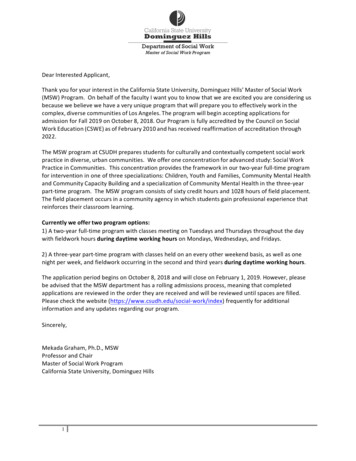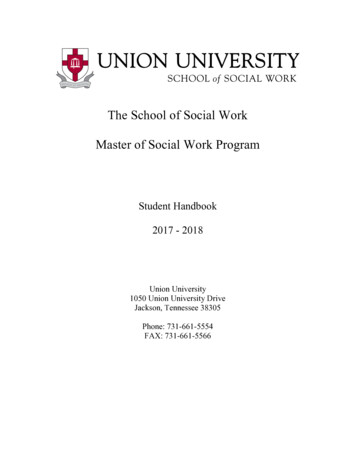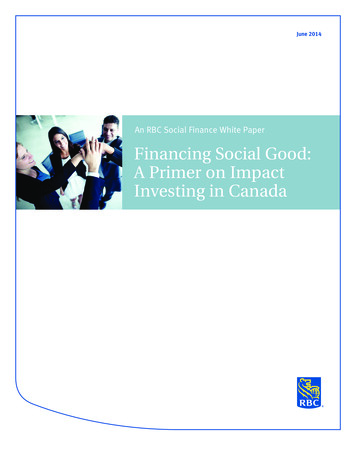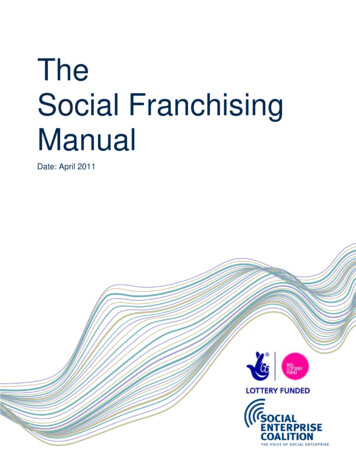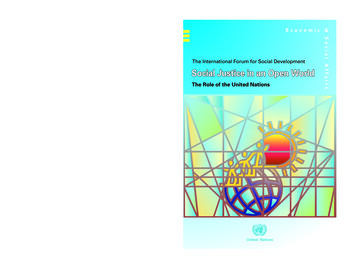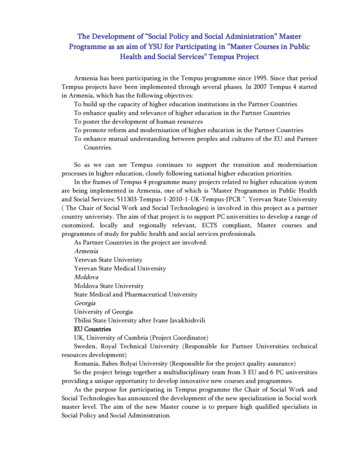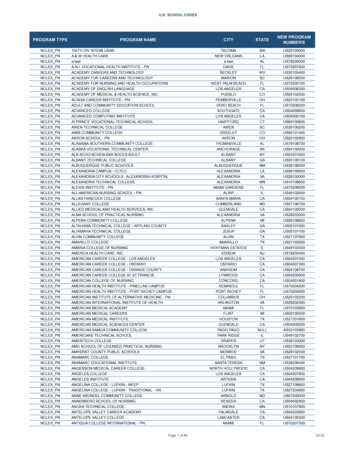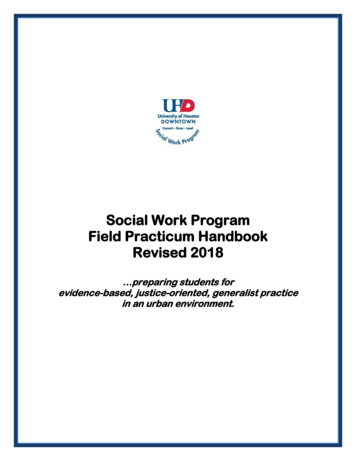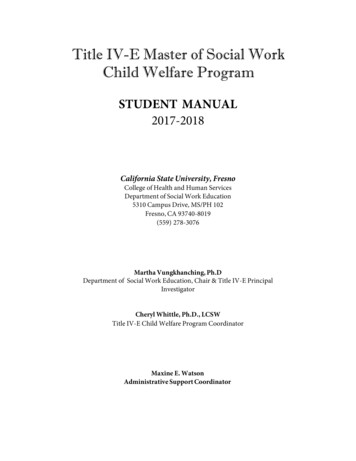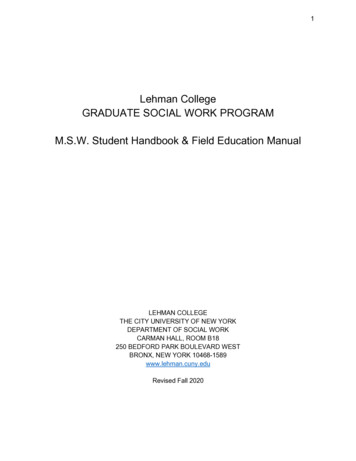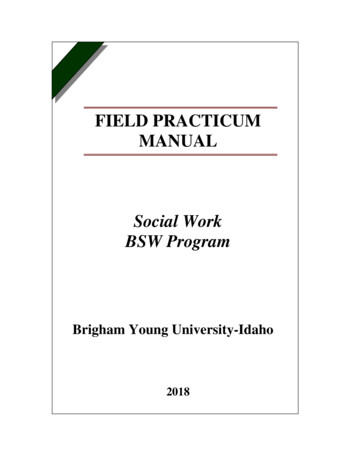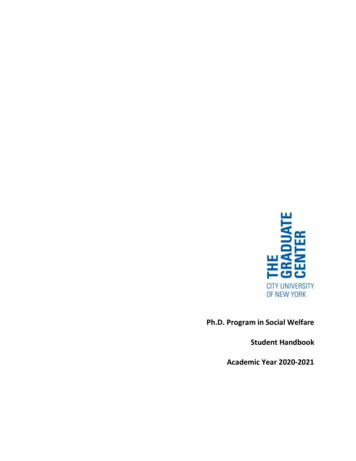
Transcription
Ph.D. Program in Social WelfareStudent HandbookAcademic Year 2020-2021
2FACULTY AND STAFFAdministrationHarriet Goodman, Associate Professor; D.S.W., City University of New YorkExecutive Officer Ph.D. Program in Social WelfareSilberman School of Social Work at Hunter College2180 Third AvenueNew York, NY 10035212-396-7559hgoodman@hunter.cuny.eduRoom 604Janille Bagcal, Assistant Program Officer, B.A. New York University212-396-7615jbagcal@hunter.cuny.eduSixth FloorFacultyMimi Abramovitz, Bertha Capen Reynolds Professor of Social Policy; D.S.W., Columbia University212-396-7535iabramov@hunter.cuny.eduRoom 432Paul Attewell, Distinguished Professor of Sociology & Professor of Urban Education; Ph.D., University ofCalifornia at San Diegopattewell@gc.cuny.eduThe Graduate Center of CUNYLuis Barrios, Professor; Ph.D., Carlos Albizu UniversityLbarrios@jjay.cuny.eduJohn Jay College of Criminal JusticeJuan Battle, Professor; Ph.D., University of Michiganjbattle@gc.cuny.eduThe Graduate CenterKatharine Bloeser, Assistant Professor; Ph.D., New York 1Luisa Borrell, Professor, Ph.D., University of Michiganluisa.borrell@sph.cuny.eduCUNY Graduate School for Public Health & Health Policy
3Martha Bragin, Associate Professor; Ph.D., New York University347-204-1242mbragin@hunter.cuny.eduRoom 612Stephen Burghardt, Professor; Ph.D., University of Michigan212-396-7524sburghar@hunter.cuny.eduRoom 455Elizabeth Capezuti, Professor; Ph.D., University of Pennsylvaniaec773@hunter.cuny.eduHunter CollegeMary M. Cavanaugh, Associate Professor and Dean; Ph.D., University of .eduRoom 405Bin Chen, Associate Professor, Ph.D., University of Southern Californiabin.chen@baruch.cuny.eduBaruch CollegeSherry L. Deckman, Assistant Professor; Ed. D., Harvard Universitysherry.deckamn@lehman.cuny.eduLehman CollegeDiane DePanfilis, Professor, Ph.D., University of Maryland, eduRoom 706Sarah-Jane Dodd, Associate Professor; Ph.D., University of Southern California212-396-7529sdodd@hunter.cuny.eduRoom 426Michael Fabricant, Professor; Ph.D., Brandeis University212-396-7558mfabrica@hunter.cuny.eduRoom 605Daniel Gardner, Associate Professor; Ph.D., Columbia duRoom 424
4Caroline Gelman, Professor; Ph.D., Smith College212-396-7542cgelman@hunter.cuny.eduRoom 403Nancy Giunta, Associate Professor; Ph.D., University of California at Berkeley212-396-7552ngiunta@hunter.cuny.eduRoom 453Sarit Golub, Professor; Ph.D., Harvard Universitysarit.golub@hunter.cuny.eduHunter CollegeBernadette R. Hadden, Assistant Professor; Ph.D., Columbia University212-396-7545bhadden@hunter.cuny.eduRoom 446Roger Hart, Professor; Ph.D., Clark Universityroghart@gmail.comThe Graduate CenterColleen Henry, Assistant Professor, Ph.D., University of California at oom 454Daniel Herman, Professor; Ph.D., Columbia University212-396-7421dhe0014@hunter.cuny.eduRoom 606Dagmar Herzog, Professor; Ph.D., Brown Universitydherzog@gc.cuny.eduThe Graduate CenterAlexis Jemal, Assistant Professor; Ph.D., Rutgers University212-396-7526aj1423@hunter.cuny.eduRoom 442Heidi Jones, Associate Professor; Ph.D., Columbia Universityheidi.jones@sph.cuny.eduCUNY Graduate School for Public Health & Health Policy
5Lila Kazemian, Associate Professor; Ph.D., University of Cambridgelkazemian@jjay.cuny.eduJohn Jay College of Criminal JusticeAlexis Kuerbis, Associate Professor, Ph.D., New York University212-396-7538ak1465@hunter.cuny.eduRoom 435Paul Kurzman, Professor; Ph.D., New York University212-396-7537pkurzman@hunter.cuny.eduRoom 434Marina Lalayants, Associate Professor, Ph.D., City University of New York212-396-7550mlalayan@hunter.cuny.eduRoom 451On Fellowship LeaveRufina Lee, Assistant Professor, Ph.D., Columbia om 437Mary Clare Lennon, Professor; Ph.D., Columbia Universitymlennon@gc.cuny.eduThe Graduate CenterVicki Lens, Professor, Ph.D., Yeshiva om 436Michael A. Lewis, Associate Professor; Ph.D., City University of New m 603Gerald P. Mallon, Associate Dean of Scholarship and Research & Julia Lathrop Professor of Child Welfare;D.S.W., City University of New York212-396-7562gmallon@hunter.cuny.eduRoom 702
6James Michael Mandiberg, Associate Professor; Ph.D., University of Michigan212-396-7525jm945@hunter.cuny.eduRoom 611Carl Mazza, Professor; D.S.W., Yeshiva Universitycarl.mazza@lehman.cuny.eduLehman CollegeJonathan Prince, Associate Professor; Ph.D., University of California, Berkeley212-396-7551jprin@hunter.cuny.eduRoom 452Rosa Rivera-McCutchen, Associate Professor; Ph.D., New York an CollegeBenjamin H. Shepard, Professor; Ph.D., City University of New Yorkbshepard@citytech.cuny.eduNYC College of TechnologyRobert C. Smith, Professor; Ph.D., Columbia Universityrobert.smith@baruch.cuny.eduBaruch CollegeBrett G. Stoudt, Assistant Professor; Ph.D., City University of New Yorkbstoudt@jjay.cuny.eduJohn Jay College of Criminal JusticeBarbra Teater, Professor; Ph.D., Ohio State Universitybarbra.teater@csi.cuny.eduCollege of Staten IslandWillie Tolliver, Associate Professor; D.S.W., City University of New York212-396-7523wtollive@hunter.cuny.eduRoom 409Deborah Tolman, Professor; Ed. D., Harvard Universitydtolman@hunter.cuny.eduHunter CollegeBryan Warde, Associate Professor; Ph.D., City University of New Yorkbryan.warde@lehman.cuny.eduLehman College
7THE PLACE AND THE SPACEStudents take most courses for the Ph.D. in Social Welfare at the Silberman School of Social Work at 119thStreet at Third Avenue or the Graduate Center located at Fifth Avenue and 34th Street. Located in thecenter of East Harlem, the Silberman School of Social Work is a state-of-the-art modern facility that housesthe Silberman M.S.W. Program. The administrative offices of the Ph.D. Program are located on the SixthFloor. There is a café on the ground floor of the building.Doctoral students have access to the School of Social Work Library on the Silberman campus, which is agraduate- and doctoral-level branch of the Hunter College Library. The onsite print collection includes55,000 books and 80 journals. Silberman students also have remote access to the Hunter Library’selectronic collections, which include 250,000 full-text eBooks, 100,000 e-Journals, and over 300 electronicdatabases. The library participates in the national interlibrary loan program which is a consortium ofacademic libraries that share resources. These reciprocal agreements allow students extensive access toa multitude of collections. The Social Work Librarian at Silberman is Margaret Bausman,mbausman@hunter.cuny.edu.Students also have access to all the resources at the Graduate Center. The Graduate Center building wasformerly the B. Altman department store, and remnants of its Beaux Arts style are still visible in the ornatestaircase and elevator of the Mina Rees Library. The Social Work Librarian at the Graduate Center isShawn(ta) Smith-Cruz, ssmith4@gc.cuny.edu. There is a cafe located on the first floor and a full cafeteriawith a ceiling skylight on the 8th Floor.Our other "space" is virtual. The GC website is at www.gc.cuny.edu and the Program website iswww.gc.cuny.edu/socialwelfare. The Program sends out important announcements via e-mail, whichinclude employment opportunities, calls for papers, upcoming conferences, and Graduate Centerprograms of interest to students and faculty. Students are given an e-mail account at the Graduate Centerwhen they matriculate, which they can use to gain access to the Silberman campus. Although studentsmay provide a preferred e-mail address to the APO, they should use their Graduate Center email for allofficial correspondence. Please update the APO if you change your personal email address, home address,or preferred telephone number.Other Graduate Center Programs and the New York Doctoral ConsortiumEach semester, a number of Graduate Center doctoral courses appropriate as electives for Social Welfarestudents are cross listed with other disciplines. Students may also enroll in other Graduate Center coursesoffered in Psychology, Sociology, Political Science, Educational Psychology, among others. Students mayalso elect to meet the requirements for certificate programs offered through the Graduate Center inWomen’s Studies, Interactive Technology and Pedagogy, Africana Studies, and Demography, amongothers.The Graduate Center is a member of the New York City Interuniversity Doctoral Consortium. Schools inthe Consortium include Columbia (GSAS and Teachers College), Fordham (GSAS), The New School forSocial Research, NYU (GSAS), Rutgers, SUNY Stony Brook, and Princeton. The student must havecompleted at least one year of study in the doctoral program and may only register for courses notnormally available at the Graduate Center. A student's cross registration must be approved by the
8appropriate deans at the home and host institutions, and a student must register at both the home andthe host institution.Governance and Student Membership on CommitteesUnder the Bylaws, the Program has three standing committees, each with two student members electedby the student body. Each student member serves for a two-year term. The Executive Committee providesconsultation and advice to the Executive Officer and meets at least twice a semester. The CurriculumCommittee meets with faculty working on curriculum issues and meets as necessary during the year. Allmembers of the Admissions Committee conduct initial review of applications to the program andparticipate in the Committee’s final decision process. The Admissions Committee conducts its workprimarily in the Spring semester. Each year students elect two members to represent them on theGraduate Center’s Doctoral Students’ Council. In addition, students elect a representative to the GraduateCenter’s Graduate Council, which is the central curricular policy-making body.THE ACADEMIC PROGRAMOverview of Requirements for the DegreeCourse Descriptions of Required CoursesKnowledge Building in Social Welfare (SSW 70000)This course brings students to an advanced level of understanding issues in social work research. Thecourse covers the nature of empirical knowledge, critical thinking, and the ontology, epistemology and,methodology of various research approaches. Presentations by doctoral faculty members and Ph.D.candidates will illustrate methodological pluralism as closely linked to decision making about methodsresearchers employ in actual studies. Students will consider the philosophical context and ethical issuesin social work research; problem/issue formulation, and the elements of a well-conceptualized,comprehensive, and critical review of the literature that organizes existing knowledge related to aproblem/issue of interest.Social Welfare Policy and Planning I. (SSW 71000)In this course, students develop an advanced capacity to analyze and think critically about social welfarepolicy though exposure to ideological frameworks, economic concepts, and political theory. The coursethen looks at the impact of social welfare policy (tax, spending, etc.) on service delivery and agencypractice. Racism, sexism, heterosexism and decision making power are examined as analytic variablesrather than descriptors and applied to explore disparities within social welfare program as well asdifferential welfare state outcomes. The frameworks presented provide students with the skills andknowledge to analyze the impact of changes in social welfare policy on individual, families andcommunities; to contextualize social work practice and to advocate for social change.
9Social Welfare Policy and Planning II. (SSW71100)Inequality of access to society’s resources, rewards, and privileges based on the often intersecting sociallydefined categories of race/ethnicity, gender, immigration status, sexual orientation/identity, class, anddisability is a prominent and persistent feature of social arrangements in the United States. Theseinequalities and the societal values, norms, ideologies, and economic arrangements that underpin themhave had a pervasive and powerful influence on social policy across all spheres of social functioningthroughout the nation’s history. This course considers the relationship between US social policy and socialinequality based on the above-described socially defined categories. More specifically, it gives a platformfor students in their advanced capacity as a social policy analyst to critically examine the extent to whichUS social policies and their underpinning factors impose and/or supports social inequality to the detrimentof the affected in areas such as the economy, health care, housing, immigration, criminal justice,education, and the labor market.Methods of Quantitative Research (SSW 75100)The course introduces knowledge and skills needed to design and carry out research that addresses socialneeds, problems, and social work interventions using quantitative research designs. The course focuseson problem formulation, developing research questions and hypotheses, conceptualizing phenomena,basic sampling, survey research, and pre-experimental, quasi-experimental, and experimental designs.The course will address the strengths and limitations of quantitative research designs and varioussampling techniques. The focus is on the logic and design of such studies rather than on data analysismethods addressed in other courses in the program.Methods of Qualitative Research I. (SSW 77000)The purpose of this course is to introduce doctoral students to the field of qualitative research and preparethem in the skills, techniques, and knowledge necessary to undertake independent research using thismethodology. The course focuses on five qualitative research perspectives: narrative, phenomenology,grounded theory, ethnography, and case studies. These methods are valuable for collecting rich textureddata; discovering themes and categories from textual data; and developing mid-range theories thatexplain how people experience and work through various problems. This course aims to familiarizestudents with the different ways of knowing and doing qualitative research on a more advanced level,culminating in the written and oral presentation of a qualitative research proposal.Methods of Data Analysis (SSW 76000)This course introduces concepts and provides experiences that enable students to gain a solidunderstanding of statistical procedures. The goal is to enable students to conduct univariate, bivariate,and multivariate statistical analysis of data. This is a course in basic statistical methods used throughoutsocial sciences. It will cover both descriptive and inferential statistics. Class sessions combine lecture andin-class exercises. The statistical computing package used for the course is an open source program called“R.” SPSS or SAS is often used for courses like this one. Major benefits of “R” are that it is free and versatile.Having one free software that does it all, rather than needing many types of expensive software toaccomplish the same task, makes it an obvious choice. The course also introduces different softwarepackages throughout, so student become accustomed to reading different formats of the same thing.
10Advanced Statistics (SSW 76100)This is the second statistics course in a two-course sequence. The major content of the course will haveto do with a set of statistical models called analysis of variance (ANOVA) and regression. These modelsare used frequently in all of the social sciences, including social work, education, and psychology. They arealso used by public health researchers and others interested in trying to determine if a dependent variableis a function of one or more independent variables. Thus, the course covers material that those interestedin quantitative research should find extremely useful. The course may also provide an introduction tosome of the more popular, cutting edge techniques used in social science today, such as multilevelmodeling, mediation, moderation, structural equation modeling and path analysis.Program Design and Administration (SSW 70000)Social work is largely an organization-based profession. Policy mandates and practice innovations areimplemented most often by and through organizations. The capacity to analyze organizations andorganization environmental forces as they impact on service implementation and innovation is a criticalskill for those seeking to develop knowledge for social work practice. This course aims to assure thatstudents have mastery of the key streams of organization theory and their application in human serviceorganizations. It focuses on the major schools of organization theory and their utility in understanding thefunctioning and dynamics of human service organizations.Dissertation Seminar (89900)The Dissertation Seminar supports Level 2 students in their submission of the Second Examination andprepares them for the next steps in their progress towards degree completion during Level 3. This includesissues in forming a dissertation committee, writing a dissertation proposal, submitting an IRB/HRRPapplication, and developing a realistic time line for completion of the dissertation. It includes professionaldevelopment activities, including how to write an effective CV, preparing abstracts for conferencepresentations and papers, writing articles for publication, securing dissertation and other funding,navigating the job market for academic and non-academic employment, pilot research, and otherundertakings to maximize the student’s post-graduation experience.Dissertation Supervision (90000) By AdvisorTHE PROGRAM’S MAJOR EXAMINATIONSThe First ExaminationThe First Examination calls on mastery of student’s foundational knowledge of the core content areas ofSocial Policy, Research Methods, Statistics, and Organizational Theory and Change. The requirements forthe First Examination require students to pass with a minimum grade of “B” the following courses: SSW76000-Methods of Data Analysis or recommendation by the Executive Officer for a more advanced coursein research methods and analysis offered in any social science or public health doctoral programSSW 71000-Social Welfare Policy and Planning; SSW 75000-Development of Practice Knowledge in SocialWork; SSW 76100-Advanced Statistical Analysis or recommendation by the Executive Officer for a moreadvanced course in research methods or analysis offered in any social science or public health doctoralprogram SSW 70100-Program Design and Administration I; and SSW 75100-Methods of QuantitativeResearch. Students must meet these requirements within four semesters of matriculation.
11The Second ExaminationThe Second Examination tests a student’s ability to develop a research proposal. The student shoulddemonstrate the capacity to identify a problem, support the significance of that problem, generatequestions appropriate for inquiry, review the pertinent literature in a complete but parsimonious way,develop research questions, and formulate a research methodology to explore those questions. Theresearch design should include how, who, and what would be asked/gathered, and the approach to dataanalysis. The examination should demonstrate the student has developed skills in conceptualization,problem/question formulation, and developing a research methodology.Students are eligible to submit the Second Examination after they have successfully completed all requiredcourses and six elective courses or 45 credits that put them at Level Two. They must be registered for thesemester they submit the examination and may not have any holds on their registration. Ideally, studentssubmit the Examinat
The Social Work Librarian at the Graduate Center is Shawn(ta) Smith-Cruz, ssmith4@gc.cuny.edu. There
